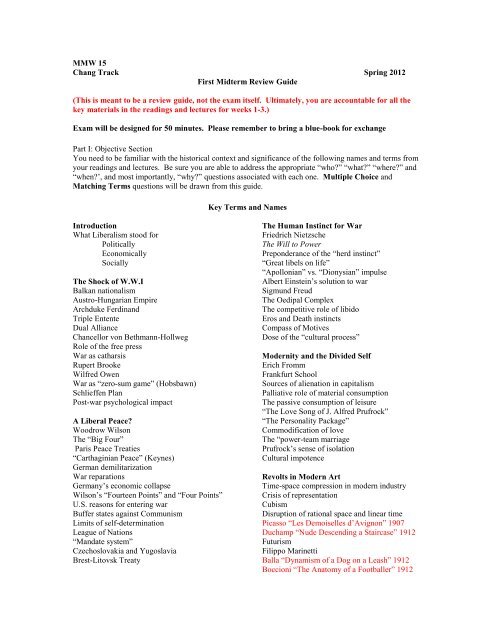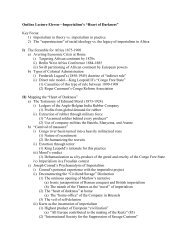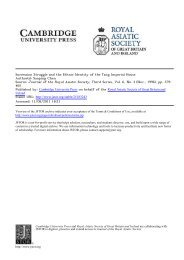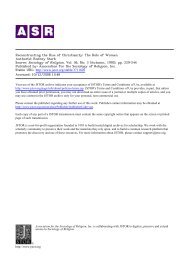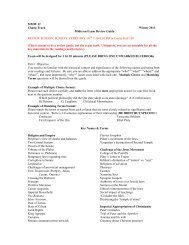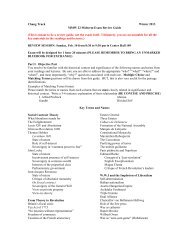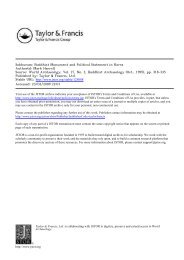MMW 15 Chang Track Spring 2012 First Midterm Review Guide ...
MMW 15 Chang Track Spring 2012 First Midterm Review Guide ...
MMW 15 Chang Track Spring 2012 First Midterm Review Guide ...
Create successful ePaper yourself
Turn your PDF publications into a flip-book with our unique Google optimized e-Paper software.
<strong>MMW</strong> <strong>15</strong><br />
<strong>Chang</strong> <strong>Track</strong> <strong>Spring</strong> <strong>2012</strong><br />
<strong>First</strong> <strong>Midterm</strong> <strong>Review</strong> <strong>Guide</strong><br />
(This is meant to be a review guide, not the exam itself. Ultimately, you are accountable for all the<br />
key materials in the readings and lectures for weeks 1-3.)<br />
Exam will be designed for 50 minutes. Please remember to bring a blue-book for exchange<br />
Part I: Objective Section<br />
You need to be familiar with the historical context and significance of the following names and terms from<br />
your readings and lectures. Be sure you are able to address the appropriate “who?” “what?” “where?” and<br />
“when?’, and most importantly, “why?” questions associated with each one. Multiple Choice and<br />
Matching Terms questions will be drawn from this guide.<br />
Introduction<br />
What Liberalism stood for<br />
Politically<br />
Economically<br />
Socially<br />
The Shock of W.W.I<br />
Balkan nationalism<br />
Austro-Hungarian Empire<br />
Archduke Ferdinand<br />
Triple Entente<br />
Dual Alliance<br />
Chancellor von Bethmann-Hollweg<br />
Role of the free press<br />
War as catharsis<br />
Rupert Brooke<br />
Wilfred Owen<br />
War as “zero-sum game” (Hobsbawn)<br />
Schlieffen Plan<br />
Post-war psychological impact<br />
A Liberal Peace?<br />
Woodrow Wilson<br />
The “Big Four”<br />
Paris Peace Treaties<br />
“Carthaginian Peace” (Keynes)<br />
German demilitarization<br />
War reparations<br />
Germany’s economic collapse<br />
Wilson’s “Fourteen Points” and “Four Points”<br />
U.S. reasons for entering war<br />
Buffer states against Communism<br />
Limits of self-determination<br />
League of Nations<br />
“Mandate system”<br />
Czechoslovakia and Yugoslavia<br />
Brest-Litovsk Treaty<br />
Key Terms and Names<br />
The Human Instinct for War<br />
Friedrich Nietzsche<br />
The Will to Power<br />
Preponderance of the “herd instinct”<br />
“Great libels on life”<br />
“Apollonian” vs. “Dionysian” impulse<br />
Albert Einstein’s solution to war<br />
Sigmund Freud<br />
The Oedipal Complex<br />
The competitive role of libido<br />
Eros and Death instincts<br />
Compass of Motives<br />
Dose of the “cultural process”<br />
Modernity and the Divided Self<br />
Erich Fromm<br />
Frankfurt School<br />
Sources of alienation in capitalism<br />
Palliative role of material consumption<br />
The passive consumption of leisure<br />
“The Love Song of J. Alfred Prufrock”<br />
“The Personality Package”<br />
Commodification of love<br />
The “power-team marriage<br />
Prufrock’s sense of isolation<br />
Cultural impotence<br />
Revolts in Modern Art<br />
Time-space compression in modern industry<br />
Crisis of representation<br />
Cubism<br />
Disruption of rational space and linear time<br />
Picasso “Les Demoiselles d’Avignon” 1907<br />
Duchamp “Nude Descending a Staircase” 1912<br />
Futurism<br />
Filippo Marinetti<br />
Balla “Dynamism of a Dog on a Leash” 1912<br />
Boccioni “The Anatomy of a Footballer” 1912
War as “Hygiene of civilization”<br />
Socio-political agenda of Futurism<br />
Dadaism<br />
Duchamp “L.H.O.O.Q.” 1919<br />
Duchamp “The Fountain” 1917<br />
Tristan Tzara<br />
Iconoclastic irreverence<br />
Readymades<br />
Surrealism<br />
André Breton<br />
Psychoanalysis and dreams<br />
Dali “Metamorphosis of Narcissus” 1937<br />
Magritte “The Human Condition I” 1934<br />
Revolutions in China<br />
1919 May Fourth Movement<br />
Call for social reforms<br />
1911 Founding of the Chinese republic<br />
Dr. Sun Yat-sen<br />
Three Principles of the People<br />
Traditional sources of ideology<br />
The Five-Power Constitution<br />
Chen Duxiu’s New Youth<br />
Mao Zedong<br />
Class struggle<br />
Role of the petty bourgeois<br />
Peasant associations<br />
India’s Anti-Colonial Struggle<br />
Massacre at Amritsar, India<br />
Rowlatt Bills<br />
Gandhi<br />
The principle of Ahimsa<br />
Economic policy of the British Raj<br />
Svadeshi or Home-spun Movement<br />
Satyagraha—“Truth Force”<br />
Ahmedabad Strike<br />
Kheda Satyagraha<br />
Principles of non-violent civil disobedience<br />
“Himalayan Miscalculation”<br />
Obedience of conscience vs. convenience<br />
Decolonization or Neocolonialism<br />
Malnutrition<br />
Illiteracy<br />
Discrimination towards former “untouchables”<br />
“No-nonsense South Korea model”<br />
Frantz Fanon<br />
Wretched of the Earth<br />
Views on decolonization<br />
Ho Chi Minh<br />
French Indochine<br />
Algeria<br />
Kwame Nkrumah<br />
Neo-colonialism vs. imperialism<br />
Financial leverage<br />
Purpose of military aid<br />
<strong>First</strong> vs. Third world disparity<br />
Part Two: Passage Identifications<br />
Three passages from the following selection will be included on the midterm. You will choose two to<br />
write on. In your response, you must identify the historical and political context in which each passage<br />
occurs (e.g. speaker, subject, occasion, purpose, general time period). More importantly, you need to<br />
explain the significance of the passage to key themes we have discussed so far (i.e. Aspirations and<br />
challenges to liberal ideals; crisis of modernity). Evidence of independent insight on the readings is<br />
strongly recommended. Each response should be a full paragraph in length, but no longer than a page.<br />
Text references will not be provided on the actual midterm.<br />
1) “Modern man is alienated from himself, from his fellow man and from nature. He has been<br />
transformed into a commodity, experiences his life forces as an investment which must bring him<br />
the maximum profit obtainable under existing marketing conditions. Human relations are<br />
essentially those of alienated automatons, each basing his security on staying close to the herd, and<br />
not being different in thought, feeling or action. While everybody tries to be as close as possible<br />
to the rest, everybody remains utterly alone, pervaded by the deep sense of insecurity, anxiety and<br />
guilt which always results when human separateness cannot be overcome.” (Erich Fromm “Love<br />
and Its Disintegration”)<br />
2) “Secondly, a revolution is not a dinner party, or writing an essay, or painting a picture, or doing<br />
embroidery; it cannot be so refined, so leisurely and gentle, so temperate, kind, courteous,<br />
restrained and magnanimous. A revolution is an insurrection, an act of violence by which one<br />
class overthrows another.” (Mao Zedong “Report on an Investigation of the Peasant Movement in<br />
Hunan, March 1927”)<br />
3) “The settlement of every question, whether of territory, of sovereignty, of economic arrangement,<br />
or of political relationship upon the basis of the free acceptance of that settlement by the people<br />
immediately concerned, and not upon the basis of the material interest or advantage of any other
nation or people which may desire a different settlement for the sake of its own exterior influence<br />
or mastery.” (Woodrow Wilson “Fourteen Points” and “Four Points”)<br />
4) “We have had enough of the intelligent movements that have stretched beyond measure our<br />
credulity of the benefits of science. What we want now is spontaneity. Not because it is better or<br />
more beautiful than anything else. But because everything that issues freely from ourselves,<br />
without the intervention of speculative ideas, represents us. We must intensify this quality of life<br />
that readily spends itself in every quarter. Art is not the most precious manifestation of life. Art<br />
has not the celestial and universal value that people like to attribute it. Life is more interesting.”<br />
(Tristan Tsara “Dadaism”)<br />
5) “And yet if they resorted to incivility it would spoil their Satyagraha, like a drop of arsenic in<br />
milk. I realized later that they had less fully learnt the lesson of civility than I had expected.<br />
Experience has taught me that civility is the most difficult part of Satyagraha. Civility does not<br />
here mean the mere outward gentleness of speech cultivated for the occasion, but an inborn<br />
gentleness and desire to do the opponent good. These should show themselves in every act of the<br />
Satyagrahi.” (Mohandas Gandhi “An Autobiography”)<br />
6) “It permits endemic malnutrition and hunger that is not acute, so long as these happen quietly; it<br />
does not permit a famine both because it would be too acute and because it cannot happen<br />
quietly…The elections, the newspapers, and the political liberties work powerfully against<br />
dramatic deprivations and new sufferings, but easily allow the quiet continuation of an astonishing<br />
set of persistent injustices.” (Amartya Sen “How is India Doing?”)<br />
Please bring a bluebook for exchange


